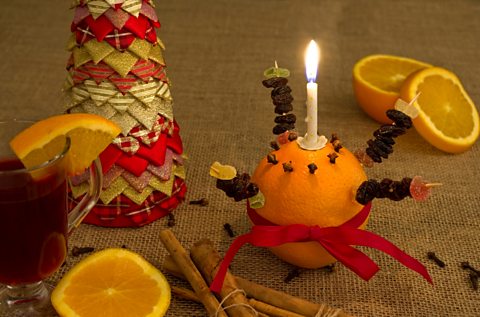Christmas
Christmas is a fixed festival. It always falls on the same date each year, as it does not matter on which day of the week Christmas is celebrated.
In the Eastern Orthodox ChurchThe second-largest Christian church. It separated from the Catholic church in the eleventh century, as it rejected the idea of the Bishop of Rome being the sole leader of the Christian Church., Christmas Day is celebrated on 7 January.
For Christians, Christmas is all about God sending His son into the world as part of His plan to bring salvation to people everywhere. Christians also think about the ÔÇśi▓ď│Ž▓╣░¨▓ď▓╣│┘ż▒┤ă▓ďÔÇÖ - literally meaning ÔÇśin the fleshÔÇÖ - when God became man in the form of the baby Jesus. The incarnation reminds Christians that Jesus is a human being, the son of Mary and Joseph, and that he is also divine.
There are many customs and traditions that are associated with Christmas. Some are related to events in the Bible (such as the nativity play) while others have been invented by Christians to make their celebration of Christmas more meaningful and enjoyable (for example, Christmas cards and carol singing). Some customs have their origin in paganAn ancient religion that involves worshipping the natural world and more than one God. traditions. These include kissing under the mistletoe ÔÇô a plant that was a symbol of fertility in pagan times.
How do Christians celebrate Christmas?
There are a variety of ways that Christian churches choose to mark the occasion. Here are some examples:
The Christingle Service
The word ÔÇśC│ˇ░¨ż▒▓§│┘ż▒▓ď▓Á▒˘▒ÔÇÖ means ÔÇśChrist LightÔÇÖ and it originated in the Moravian ChurchOne of the oldest Protestant denominations in the world, established in the Kingdom of Bohemia in the 15th century.. Worshippers (often children) are given a Christingle to hold and there may be a candlelit procession around the church. This is the symbolism of the christingle:
- orange = the world
- candle = Jesus, the light of the world
- red band = blood of Christ, shed for the world
- cocktail sticks = four seasons
- nuts and fruit = the good things the earth provides

The Service of Nine Lessons and Carols
This traditional service originated in KingÔÇÖs College Cambridge and is now used in churches of many denominations. Usually it starts with the carol O Little Town of Bethlehem, then there is the bidding prayer in which people are bid to come and celebrate the birth of Christ. There then follows nine readings from the Old and New Testaments. These tell first of GodÔÇÖs covenantAn agreement or promise. with the IsraelitesThe descendants of the patriarchs who lived in the land of Canaan, which is also called the Land of Israel., then the promise of the MessiahThe word means ÔÇśthe anointed oneÔÇÖ. The Messiah is the one believed to be sent by God to be humanityÔÇÖs saviour. Many Christians believe this person to be Jesus.. The stories of JesusÔÇÖ birth from Matthew and Luke are read and the final reading is always the beginning of JohnÔÇÖs Gospel. The readings are interspersed with carols, sung either by the choir or congregation.
Midnight Mass
Many Roman Catholic and Anglican Christians attend this service on Christmas Eve so that they can begin Christmas Day in the proper frame of mind.
Family service
Some denominations hold a special service on Christmas morning. Young children may be encouraged to bring their toys. Christmas carols are sung and there are Bible readings based around the Christmas story.
Epiphany
The twelfth day of Christmas, 6 January, is Epiphany. This marks the end of the Christmas season. The word ÔÇśepiphanyÔÇÖ comes from the Greek language and means ÔÇśto show forthÔÇÖ. Traditionally, this is the date of the visit of the MagiThe three wise men, or three kings, who brought gifts of gold, frankincense and myrrh to Jesus when he was born. when Jesus was ÔÇśto show forthÔÇÖ as GodÔÇÖs Son to non-Jews. Christians believe that this is significant as it is a sign that JesusÔÇÖ birth would be important for all people and not just the Jews. This idea is known as universalism.